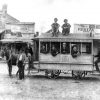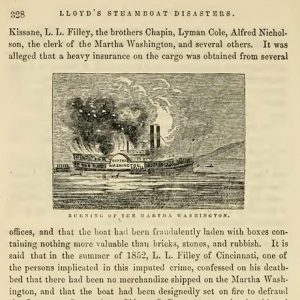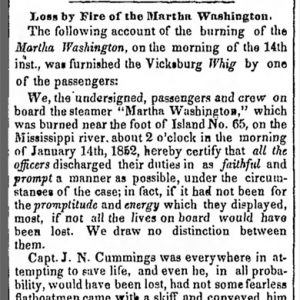calsfoundation@cals.org
Martha Washington [Steamboat]
The Martha Washington was a steamboat that caught fire on the Mississippi River south of Helena (Phillips County) on January 14, 1852, with as many as nine people losing their lives. Several trials were held later amid allegations that the fire was deliberately set for insurance purposes.
The Martha Washington was a 299-ton sidewheel paddleboat built at Cincinnati, Ohio, in 1847 for runs between Cincinnati and New Orleans, Louisiana. The steamboat was heading south on the Mississippi River when it caught fire near Island 65 at around 1:30 a.m. on January 14, 1852.
Captain John N. Cummings “was everywhere in attempting to save life,” and “the pilot and engineer stood at their post like heroes amid the smoke and flames; nor did they leave before the boat was run ashore,” a newspaper reported. While many of the Martha Washington’s passengers and crew escaped on the boat’s yawl, Cummings and mate William Holland were trapped until three men on a flatboat rescued them “from its tottering and ruined wreck.”
The Martha Washington was destroyed in minutes, and at least six people died in the flames, including a couple and their two children, “and probably two or three others, names unknown, as the books and papers were all lost.” The steamboats James Millinger and Charles Hammond took the survivors aboard and brought them, “free of charge, to their various destinations.”
In the summer of 1852, a man named L. L. Filley made a deathbed confession that “there had been no merchandize shipped on the Martha Washington, and that the boat had been designedly set on fire” in an insurance scheme. Sidney C. Burton of Cleveland, Ohio, who lost $1,500 in leather he was shipping on the steamer, filed suit against several people, including William Kissane and Alfred Nicholson, the Martha Washington’s clerk, alleging they had collected insurance money though “the boat had been fraudulently laded with boxes containing nothing more than bricks, stones and rubbish.” As a result, the insurance firms would not pay on Burton’s claim for his lost cargo.
The alleged conspirators were arrested on charges of barratry for the insurance fraud and murder for the deaths of the passengers who died in the flames of the Martha Washington. Kissane was tried in courts in Cincinnati and Lebanon, Ohio, and convicted, though he was acquitted after receiving a new trial. All of the alleged conspirators were tried at Columbus, Ohio, and acquitted.
Undeterred, Burton received a warrant from the governor of Arkansas, and the alleged conspirators were arrested in Cincinnati in 1854 and transported in irons to Helena, “where they were confined in a miserable jail three months.” They were acquitted at trial, but the prosecutor apparently levied new charges against them.
Kissane, needing money for his rising legal bills, was arrested for forging a draft on the Chemical Bank of New York. He was convicted and sentenced to two and a half years in prison but was pardoned by New York’s governor in December 1855. Burton, meanwhile, and a man named Coons were indicted in Ohio for perjury after Coons confessed that Burton had paid him to lie in the trials of the alleged conspirators. Burton died on December 11, 1855, “in circumstances which give a color of probability to a prevailing suspicion that he was poisoned,” apparently ending the legal drama surrounding the burning of the Martha Washington.
For additional information:
Lloyd, James T. Lloyd’s Steamboat Directory and Disasters on the Western Waters. Cincinnati, OH: James T. Lloyd & Co., 1856.
“Loss by Fire of the Martha Washington.” Louisville [Kentucky] Daily Courier, January 26, 1852, p. 3.
Quick, Herbert, and Edward Quick. Mississippi Steamboatin’: A History of Steamboating on the Mississippi and Its Tributaries. New York: Henry Holt and Company, 1926.
“Remarkable Incident.” New Orleans Daily Delta, January 16, 1852, p. 2.
“Steamboat Burned.” Albany [New York] Evening Journal, January 16, 1852, p. 3.
Way, Frederick, Jr. Way’s Packet Directory. Athens: Ohio University Press, 1983.
Mark K. Christ
Central Arkansas Library System


 Martha Washington Article
Martha Washington Article  Martha Washington Steamboat Article
Martha Washington Steamboat Article 



Comments
No comments on this entry yet.